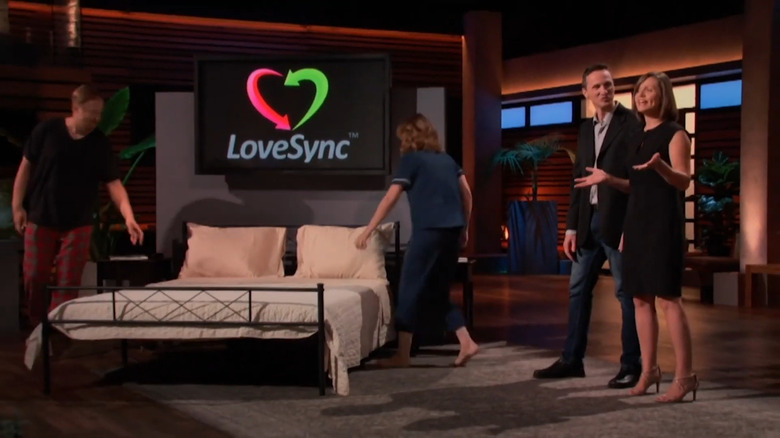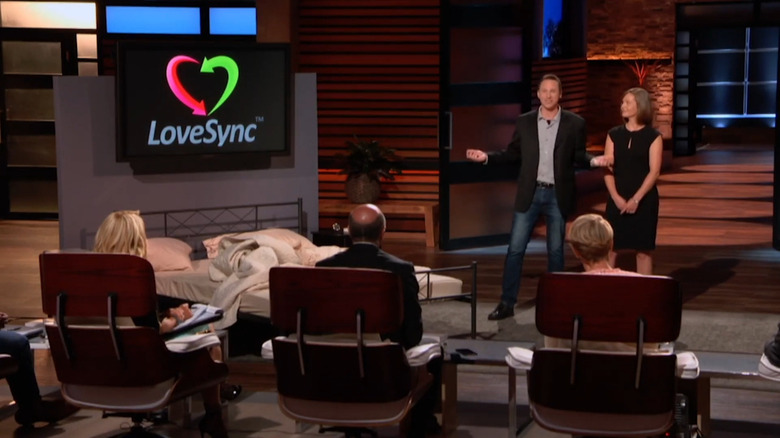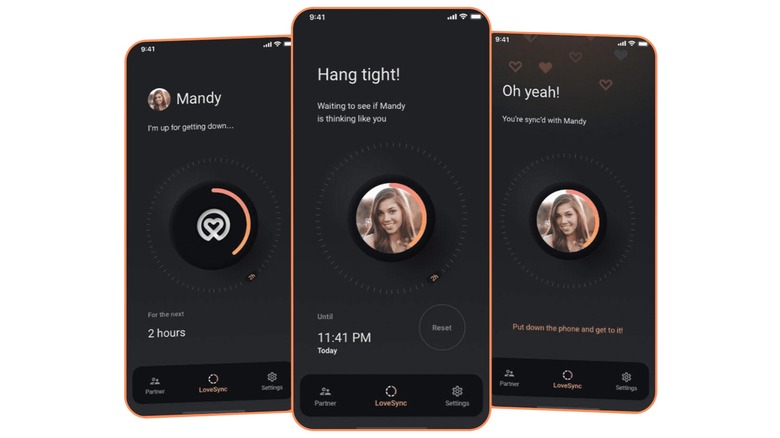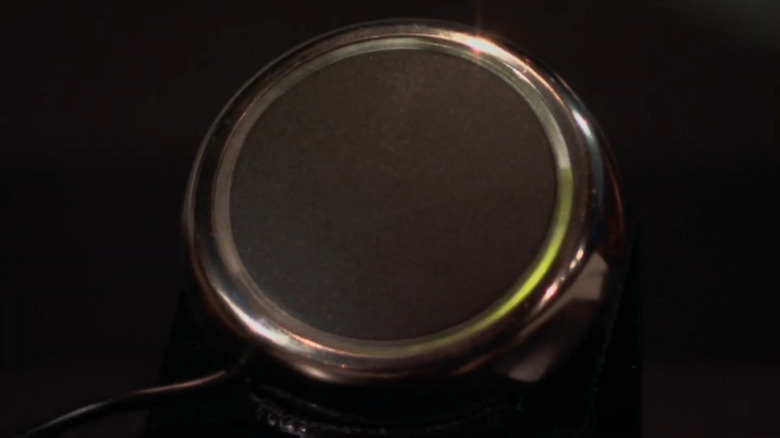What Happened To The LoveSync Button From Shark Tank Season 11?
The 11th episode of the 11th season of "Shark Tank" premiered on ABC on January 12, 2020, to an audience of 2.75 million people according to Nielsen Media Research's viewership ratings. The third of four pitches in that week's episode was for LoveSync, a device designed to make couples' conversations around intimacy less uncomfortable by letting them quietly press a button indicating that they're in the mood, lighting up if both partners pressed it in a designated window.
We should note that LoveSync's website has a disclaimer page stressing that "These products were designed to help adult partners communicate sexual desire, NOT consent" and "The use of these products can never constitute sexual consent, regardless of who pressed which button(s.)" The Sharks largely didn't like the product, and the one who did was so put off by how the pitch was handled that they also went out, so there was no deal.
Jenn and Ryan Cmich, the married couple consisting of a therapist and an engineer, respectively, have continued to work on LoveSync since their "Shark Tank" episode premiered in the latter days of pre-pandemic life, but it's unclear if they've had much success. Their media availabilities have been very selective since the months following the premiere, and the physical button has shot up dramatically in price, seemingly due to lack of demand killing their margins. They've pivoted towards an app-based solution, but with mixed results. Let's take a more detailed look at how LoveSync's entire "Shark Tank" journey played out.
What happened to LoveSync on Shark Tank?
Married entrepreneurs Jenn and Ryan Cmich entered the tank seeking a $100,000 investment for a 10% equity stake in LoveSync, their company making devices to streamline couples' communication around physical intimacy. The concept itself is simple: Each half of the couple has a button on their nightstand, and if they're in the mood, they press the button. If both press their respective buttons, both buttons light up. In a Kickstarter campaign in advance of the episode's filming, the Cmichs had sold $21,600 worth of pre-orders and shipped all 442 of those units to their backers. The retail price that they were selling the kits for at the time was $60, with a $22 cost per unit that they were hoping to get down to $14 or less with more volume.
Lori Greiner opted out, feeling it went too far into the realm of replacing real conversations. Mark Cuban was skeptical that there was a scalable business, to which Ryan responded that LoveSync's mobile app, with a subscription model for monetization, was the future, but Mark opted out regardless. Daymond John followed, feeling it was too early, and Barbara Corcoran joined him, saying that while she liked the product, the price was too high and Ryan danced around the legitimate concerns raised by the Sharks. Finally, Kevin O'Leary went out over the poor pitch, so there was no deal, with LoveSync faring worse than other relationship-centric pitches like the Tabby dating app from season 13, the Hater dating app from season nine, and privacy for cheaters solution CATE App from season four.
What happened to LoveSync after Shark Tank?
As promised, the Cmichs were well on their way to getting a LoveSync mobile app to market, as they announced its release on both iOS and Android in a July 2020 press release, "If you're feeling 'in the mood', you tap the app. If your partner is also feeling frisky and has tapped their app, you'll both be notified to put down your phones and get to it!" said Jenn Cmich. "However, the unique aspect of the app is that your partner only knows you're interested if they are, too."
"Smartphones and social media have made connecting with others so easy that we are in touch with each other more than ever before," she added. "LoveSync will do the same for initiating connection in our most important relationship, the one with our partner."
Shortly thereafter, in August 2020, the Cmichs and LoveSync were profiled in Crain's Cleveland Business. According to that article, the app had been downloaded in excess of 4,500 times since its soft launch three months earlier, while they had sold 300 button sets to non-Kickstarter customers to date. However, the Cmichs made it clear that they were no longer focusing on the physical buttons, instead pushing the app first and foremost, with Bounce Innovation Hub advisor James Hilton helping them through the process. Jenn, meanwhile, added that the long-term goal was to make LoveSync an all-encompassing app for communication between couples, with the possibility of a couples' therapist log-in option.
Is LoveSync still in business?
As best as we can tell, LoveSync is still in business, and the button sets are still available, but they've taken a back seat to the mobile app in a major way. How major? The price of a button set has more than quadrupled in five years, to $249.99. (It's easy to infer that low demand has made it difficult to get the buttons at a lower cost.) The mobile app, meanwhile, is still on both the Google Play Store and Apple App Store. Reviews for the app average 3.3 stars out of five (out of 108 ratings) and four stars out of five (out of 168 ratings) on each respective store.
The app has been kept updated on a semi-regular basis, with the Android app last revised in December 2024, while the iOS app was last refreshed three months earlier in September. As of this writing, the two most recent Android reviews, from September and October 2024, bemoan the steps taken to monetize the app, with a subscription now needed after three syncs in a month. (The same goes for the most recent iOS review, from January 2025, which claims the app sometimes says you're out of syncs before hitting three.) LoveSync+, which gives you unlimited syncs, a sync window up to 12 hours, a "sync score," private messaging, and the removal of in-app adds, costs $6.99 per month per couple or $69.99 per year per couple if paid upfront in an annual subscription.
What's next for LoveSync and its founders?
When it comes to LoveSync proper, it doesn't seem like there's much on the horizon beyond continuing to push into the subscription model. The Cmichs have done very little media about LoveSync since 2020, with the only more recent interview we could find — on the "Lessons from the Tank" podcast — being from 2022, before the pivot to subscriptions. LoveSync's social media pages on X, formerly known as Twitter, Instagram, and Facebook have all been dormant since 2022, so it doesn't seem like there are any plans to market the app beyond "Shark Tank" reruns. In addition, there's nothing on the LoveSync website that's bound to any specific point in time, so that's pretty much the extent of what we can say about the future of the app with the Cmichs not doing much in the way of media.
Behind the scenes, the Cmichs continue to work full-time in their previous careers that they had long before "Shark Tank," with LoveSync being a side hustle. Jenn's LinkedIn page shows that she's still, as she's been since 2015, the Operations Manager at Avenues of Counseling and Mediation, a private mental health practice, and added a side gig in equine-assisted therapy in 2022. According to Ryan's LinkedIn page, he had a longer journey: In 2021, he left his pre-LoveSync job as a robotics engineer for MTD Products for a similar role at Stanley Black & Decker, before settling at Apple as a System Product Design Engineer in 2023.




